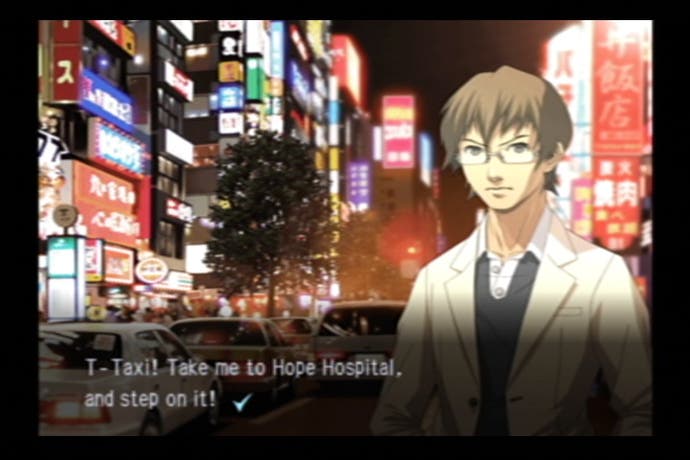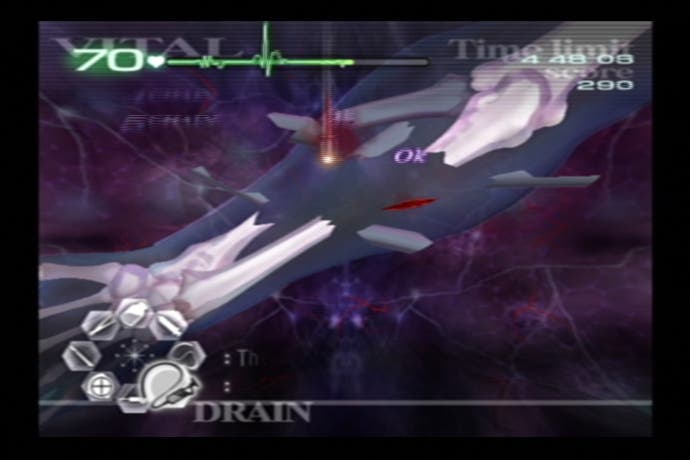Trauma Centre: Second Opinion
On the cutting edge.
It's clear from the response to Eurogamer's first Wii reviews that the control system hasn't won you all over. For every pleasantly surprised launch-lover, marvelling at the precision and subtlety in Wii Sports bowling or tennis, there are several more cautious observers, standing back with one eyebrow raised at the mini-game-heavy Raving Rabbids, and Twilight Princess - the latter, despite its brilliance, often showing itself up as a GameCube port. There are enjoyable games here, certainly, but none of them does much to fill us with cheery confidence about the console's future; none of them really shows off the breadth and sophistication of control that the Wii is capable of.
None of them except Trauma Centre: Second Opinion, that is, which (typically) will not be released in the UK for another month or more. It is a remastering of the DS' excellent Under the Knife, an intense and challenging surgery puzzle game, which follows the career of young surgeon Derek Stiles as his talent sees him transferred from an ordinary hospital into a global medical organisation in order to fight increasingly fiendish viruses and cure increasingly worse-off patients.
It tackles terrorism, euthanasia, betrayal and biological warfare, all with typical Japanese-sci-fi drama and flamboyance. Although the basic storyline of the game remains the same, the operations have all been changed significantly to take full advantage of the new method of control. It might as well be an original title. It's difficult to talk about improvements because the entire experience is completely different - having played Under the Knife to death is no excuse for passing this by. Indeed, if you loved Under the Knife as much as I did, then the greater flexibility, different selection of operations and increased longevity should make this an even more attractive prospect than it would be to a curious newcomer.

Second Opinion's multi-levelled, wonderfully histrionic story is told through a sequence of nicely drawn if rather basic still images and text, but that doesn't detract from the drama. Trauma Centre's greatest talent is putting you in the moment, crafting situations that make you really care about the patients at stake, compelling you to save their virtual lives with your own hands. The operations themselves are full of unexpected surprises, consistently requiring you to think on your feet and adapt to the situation. Ordinary biopsies turn into fevered battles against fiercely adaptive viruses, operating on someone's throat reveals a widespread infection that needs urgent attention. You'll be operating on patients on the brink of death, flat-lining car-crash victims, terminally ill children - even a bomb (still one of the game's highlights) - everywhere from hospital beds to planes to African deserts. The variety is enormous, the tension unrelenting.
The best thing about it is the fact that everything, from excisions to defibrillation to draining and twisting and grabbing and stitching and lasering, is done with your hands. This is a level of immediacy that even Under the Knife cannot come close to equalling. You grab hold of things between finger and thumb, physically twist shards of bone around and fit them back into place with your right hand, pull things out of patients by moving your hand away from the screen and actually place defibrillator pads onto patients chests, squeezing both triggers to release the charge. This is as close to actual surgery as any game would ever want to be, and it is a completely unique experience. If you fail an operation, it's your fault. You weren't fast or accurate or clever enough to outwit the virus.

As a result of all of this, Second Opinion is extremely demanding. It demands your undivided attention, precise movements and very skilled manoeuvres. Like Under the Knife, it's extremely challenging, often to the point of immense frustration, but unlike Under the Knife, it does relent occasionally - it will let you switch the difficulty from Easy to Normal to Hard on any given operation, so that if you really are stuck on something you can still progress to the next task. People without the lightning-fast reflexes that Trauma Centre expects will not hit the brick wall of difficulty that they faced on the DS. Second Opinion is more considerate of the player, but no less difficult on the higher settings, meaning that established players will find much here to keep them entertained.
Were it not for Zelda, Trauma Center: Second Opinion would be the best of the Wii's launch titles by a very long way. It might be a remake of the DS game, but the effort and obvious ambition that has gone into reworking it for the Wii is extraordinary. It is a different game, and a much better game at that, and anyone who loved Under the Knife for its uniqueness, difficulty and occasional obstinacy will love Second Opinion even more. Crucially, though, Second Opinion is more accessible than its predecessor, which combined with its even greater immediacy should help it find a much-deserved wider audience. It outstrips the likes of Red Steel and Monkey Ball by miles with its clever, discerning application of the Wii control system, taking advantage of its subtleties without shoehorning pointless waving and shaking in where it's not needed. It makes better and more appropriate use of it than any other game so far.
I'm completely in love with Trauma Centre: Second Opinion. It's urgent, tense, dramatic, unique, extremely difficult and surprisingly varied, an excellent Wii game and an excellent puzzle game. For anyone suffering from scepticism and uncertainty about the validity of the Wii's control system and doubting developers' abilities to create games to live up to its potential, Trauma Centre: Second Opinion is the perfect remedy.

